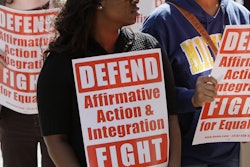As American work environments become more diverse, tension and conflict are more likely to occur, making the need for research and theory about diversity education important, a panel of diversity training experts said at a conference in Arlington, Va., on Friday.
Research and theory have shown potential drawbacks and outcomes of diversity education and also illustrate how educators can conduct diversity initiatives to be more consistent and efficient, scholars said in a panel during the George Mason University-sponsored conference, “Teaching and Training Workplace Diversity: Bridging the Research-Practice Gap,” held from July 10-12.
“A lot of emotions are involved in diversity, people attach a lot of values to it and it’s a very personal thing,” said Dr. Derek R. Avery, an associate professor of psychology at the University of Houston.
If done incorrectly, diversity training can do more harm than good, leading to more conflict, polarization and tension, Avery said. Done properly, it can improve communication, cohesion and productivity between individuals in professional settings.
Research and theory can guide diversity education and training by offering new tools and ideas for educators, said Avery, who specializes in diversity in the workplace and cultural psychology. However, it does not offer a “five-step,” prescriptive approach to addressing the oftentimes tense and complex process of diversity education.
“It doesn’t give us all the answers that we need,” Avery said. “It gives us an idea of what things we should study in the future so we have a better idea of how we should go about designing and implementing diversity training.”
Dr. Lynn Bowes-Sperry, an associate professor in the Department of Management at Western New England College’s School of Business, said “observer intervention” and other research findings in the area of ethical decision-making and behavior can inform diversity training practices.
Research shows that when people make decisions about “business” issues, they are less likely to consider ethical implications of their decisions and thus make less ethical decisions, Bowes-Sperry said. She went on to say that the ethical decision-making process of learners is relevant to their learning and implementation of some diversity-related skills such as intervening in sexual or racial harassment of others that they witness.
According to research Bowes-Sperry cited, people perceive “acts of omission,” in which their inaction causes harm, as less unethical than “acts of commission.” For example, employees who observe the sexual or racial harassment of a coworker and take no action to address the harassment are less likely to perceive their own behavior as an ethical issue than they are the behavior of the harasser, Bowes-Sperry said.
She added that in her dissertation, she found that people who perceived a situation of sexual harassment that they observed as an ethical issue were more likely to say they would intervene in the situation.
“Given that values-oriented ethics training programs can influence employees’ ethical decision-making and behavior at work, it makes sense to coordinate diversity training with ethics training is some fashion,” she said.
However, some diversity consultants attending the panel discussion expressed concern that talking about morality would not be received well in some organizations.
Avery went on to speak about “political correctness.” He recently co-authored an article published in the June edition of the Journal of Management and Education about how diversity training can possibly impede on diversity learning if people aren’t open about their beliefs. The article examined the interaction between authenticity and sensitivity and how the interactions of the two impact how participants will benefit from diversity training initiatives.
“It’s important to be [both] sensitive and authentic in discussions about diversity,” Avery said.
Avery said it’s important to emphasize diversity education as a life-long and continuous process. Diversity training and interventions are temporary, he said. “There’s only so much people can learn in those short-term processes.”
Other panels held during the two-day conference tackled issues such as diversity training in organizational and global contexts, the role of scholarship and research in diversity education, and the problems encountered by diversity educators and how these individuals can deal with resistance to diversity teaching and training.
Click here to post and read comments
© Copyright 2005 by DiverseEducation.com















